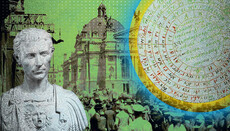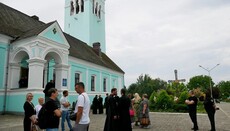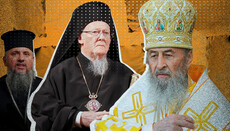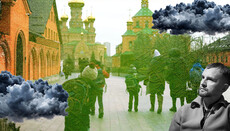UOC-KP and "Disputed" Parishes: the Force of Law or the Law of Force?
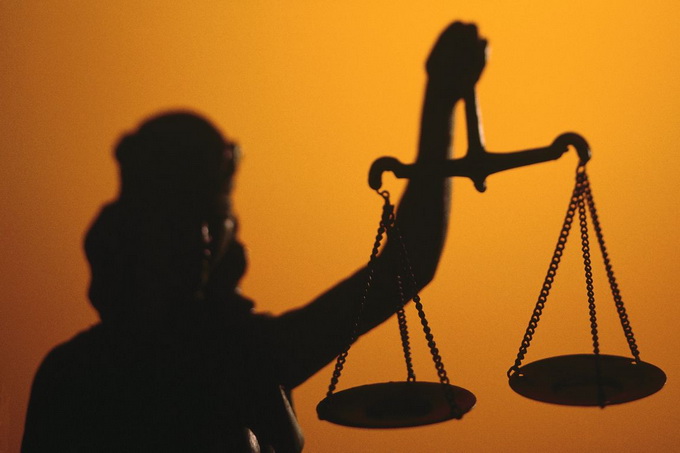
For about two years the inter-faith situation has remained tense. Raider seizure of churches of the UOC and "fake" referendums on the transition of communities, with "dead souls" (phantom voters) counted, as in Gogol's novel, have become commonplace for Ukraine. As each trend develops according to certain laws and scenarios, we can retrace phases of their development, resulted in the present day situation.
When the "abstract" boundaries of religious communities became definite
When the problem with the so-called "referendums" on the transition of the UOC parishes under the jurisdiction of the UOC-KP only began, the phenomenon was unprecedented, and therefore the representatives of the Ukrainian Orthodox Church at first did not know how to deal with it. While in the early 90-s almost all the Western Ukraine suffered from seizures of churches, today seizure schemes are becoming more intricate and fraudulent to look civilized in the eyes of society.
First, a referendum was held in a village, during which "pseudo-surveyors" asked the respondents to fill in a bulletin with one question and two absolutely manipulative answers. People had to answer the question which church they would like to see in their village - Ukrainian or Russian. Amid a difficult socio-political situation and military aggression, with a focus on dislike of the Russian Federation, the organizers believed that community members would vote for the so-called "Ukrainian church."
For people, unaware of church canons, the question seems simple and the answer - obvious: of course, everybody wants to see a Ukrainian church in the village where they would pray for peace and accord in Ukraine and the return of our soldiers from the war alive. However, only then the deceived respondents could find out what stands for the issue: transition of an already existing church of the Ukrainian Orthodox Church under the jurisdiction of the so-called Kyiv Patriarchate, unrecognized in the Orthodox world.
First, such a scheme worked effectively, giving grounds for further church raids. Raiders the UOC sanctuaries, having the results of the "pseudo-referendums" in hand, came to the churchyard, made fights, sawed the locks and behaved as if they had the ownership right on the UOC churches.
Such a situation, for example, occurred in the village of Uhryniv in September 2014, when on the initiative of a local businessman Andriy Turak, the Church of the Exaltation of the Holy Cross was taken over by force in Volyn Diocese of the UOC. Then the village council took the side of the businessman, even trying to evict the parish Archpriest Rostislav Sapozhnik from a church house, where he had lived for more than a decade. The fact that the priest has two minor children didn’t stop the raiders. Time put everything in its place, and the court accused the village authorities of abuse of power.
In the other troubled parishes the situation has also changed a lot. Recovering after the unprecedented and unceremonious manipulative use of fake referendums on parish transition, representatives of the Ukrainian Orthodox Church began to strongly defend their religious rights - including property. Therefore, it is necessary to consider the outcomes.
Lawsuits won by the UOC communities
Any criminal scheme is effective until it is exposed and adequate countermeasures are found. The same can be said about the UOC church seizures by representatives of the UOC-KP. So orthodox lawyers have learned how to deal effectively with raiders and their arguments were sufficient enough for Ukrainian courts to reaffirm the right of the UOC community on their sanctuaries.
For this statement not to sound unfounded, let's look at a number of lawsuits won by the UOC lawyers:
• The Kolosova case had been subject to court jurisdiction several times until the UOC community managed to defend its right of ownership on the church. The Appeal Administrative Court of Lviv became the final judicial authority which confirmed the ownership of the property - the church premises belong to the UOC community, and not those who encroach on them without the slightest legal and moral justification for such actions.
• Uhryniv story has not had a happy end yet, though there is a certain breakthrough: apart from winning a court case on the village council having abused its power, Father Rostislav Sapozhnik won another case concerning the illegal actions of Horokhiv law enforcement officers.
• The Holy Virgin community of Hrybovytsia village won a lawsuit on the inaction of the investigating officer to whom believers of UOC appealed on the violation of their rights.
• The UOC community of Riasnyky village defended its rights in the Rivne district court. Thus, a claim of the UOC-KP for alternate service in the UOC church was rejected. At the hearing the lawyer who represented the interests of the KP community was completely unprepared. Moreover, Ms. Toros adduced not clear arguments, referring to "The Law of Ukraine on Freedom of Conscience and Religious Organizations", showing her incompetence in religious matters.
• The Court of Appeal of Kyiv threw out a lawsuit filed by representatives of the UOC-KP, in which they expressed their claim on the church in the village of Ptycha, Rivne region.
• The District Court of Goshcha ordered the investigators to reopen legal proceedings on a church seizure in the village of Chudnytsa. Although it is too early to speak about winning the case at the moment, however, obligations of law enforcement officers are no doubt a good sign.
• Similar to the cases mentioned above is the church seizure in Mylcha village, Rivne region. Law enforcement officers "did not see" any offense in the illegal takeover of the UOC church and did not open a case. However, according to the court ruled they were obliged to do so. The next hearing confirmed that the community of the UOC is the rightful owner of the church.
All these cases prove that where the force of law works, the legal grounds of the rightful owners on the possession and use of church buildings are recognized. Therefore, even inaction of those who should protect the law, but instead fail to carry out their duties, is not supported in court. But will the decisions of the Ukrainian courts satisfy those who want to get their way at any cost? Events in the village of Ptycha, Rivne region, proved the opposite.
The law of force instead of the force of law
For more than a year the church in the village of Ptycha has been in the epicenter of not only litigation and verbal disputes but also power clashes. Despite lawsuits won by the UOC community, representatives of the "Kiev Patriarchate" are not going to settle. Therefore, such methods as sticks and even Molotov cocktails are employed. People on both sides of the conflict monitor its development. They may trace all the stages of its chronicles. And those who do know the details may find them in the public domain.
Each episode of this confrontation shows when it comes to their own ambitions, representatives of the UOC-KP does not even agree to implement the decisions of courts of Ukraine, love to which they so ardently preach, calling believers and defenders of the UOC "Moscals"(pro-Russian) and "titushky." What is then real motivation in this denomination and when will they finally settle down?
Again, rhetorical questions arise in reflections on interfaith theme. And, probably, it will last long unless one of the Ukrainian denominations understands that to gather under the RSA rallies demanding the violation of the rights of other people is absurd, at least. If, of course, we speak of a democratic state, where the rule of law is fulfilled and common sense prevails. And if not, who is guaranteed against "good people" who may come to your house one day with the words: "Let's hold a referendum on living in your home in turns"? Not a very attractive prospect, isn’t it?

